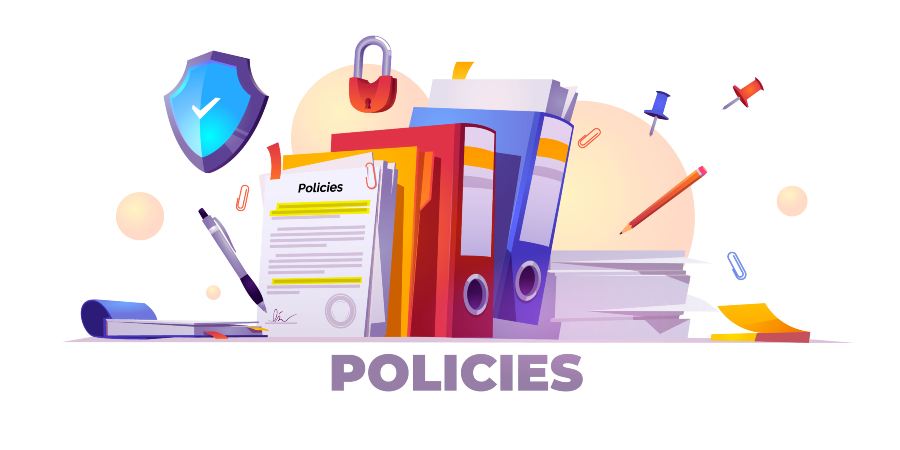As usual with most of the policies sample posted here, there is some default data that should be listed in the policy header and footer. Below are some of the info that you need to include in your pharmacy standard evaluation guidelines policy header:
- Hospital name, obviously.
- Pharmacy department operational policy and procedure, this header just to notify the reader that the following policy belongs to which department.
- Policy code or Number, for filing/indexing purposes.
- Edition Number, same purpose as above.
- Title of the policy, in our case; it would be pharmacy standard evaluation guidelines policy.
- Important dates [date reviewed, approved date, effective date and due for review date].
- Applies to [department] in this case it should be pharmacy department
- And last but not least, you’ll mention the nature of the policy, whether it’s going to be multidisciplinary or department specific. (Department specific policy)

Pharmacy Standard Evaluation Guidelines Policy
Definitions
Pharmacy standard evaluation: the checking of all pharmacy sections will be carried out by pharmacy supervisor and well-trained pharmacy team to ensure that the pharmacy service is conducted in accordance with accepted ethical and professional standards of practice and meets the legal requirements.
Purpose
To assure that pharmacy policy comply with safe medication practice as per the national and international standards.
Policy
All pharmacy sections will be checked quarterly using the attached list (pharmacy standards check list).
Procedures and responsibilities
The checklist for the specified section will be used to document the quarterly inspection by pharmacy supervisor.
Pharmacy supervisor along with well-trained pharmacist carries out the inspection on quarterly basis.
All pharmacy checklists should be filed and documented in case of any discrepancy, the comments should be documented and a time framed action plan should be done by the concerned pharmacy supervisor and by pharmacy director.
Attachments
You’re almost done and pharmacy standard evaluation guidelines policy is almost ready, what’s remaining is just few basic policy layout filling.
- References.
- Revisions: Revised as per timescale.
- Distribution: Here you should mentioned where this policy will be sent, and which departments will get a notification for it; for our current pharmacy standard evaluation guidelines we are going to sent it to:
- Medical and hospital director.
- Pharmacy department.
- Signed originals is maintained in manual & indexing office.
The policy is now finished, and it’s time to get proper signatures, whether your hospital is implementing an electronic signatures, or manual sign and stamp.
Pharmacy Standards Checklist
Pharmacy Standard Evaluation Guidelines Policy
The checklist is consisting of series of statements and each statement is given a score, based on that score the final score will be counted, the score is of 4 grading scores as follows:
| 2 = MEETS STANDARDS |
| 1 = PARTIALLY MEETS STANDARDS |
| 0 = DOESN’T MEET STANDARDS |
Inpatient unit-dose area
| # | Description | Score |
|---|---|---|
| 1 | Are all unit dose trolleys arriving pharmacy and leaving at proper time as agreed and followed up by the pharmacists thought daily trolleys time able. | |
| 2 | Are Pharmacist following proper criteria for reviewing and verifying unit dose ordered before dispensing including but not limited to (History, reconciliation, allergy, dose, dosage form duration, administration route, ASO, duplication, drug-drug interaction, drug-food interaction, approved abbreviation, etc.) | |
| 3 | Are caution statement labels concerning proper administration of certain drugs added (and writing the proper dose) to ensure proper drug administration and patient safety? And other auxiliary labels added (protect from light, fall risk…etc.) | |
| 4 | Are second verification is carried out after preparation of each medication order and unit dose trolley. | |
| 5 | Are trolleys preparation carried out properly by: ……….. | |
| 5.1 | Ensure that all medication prepared are administrated properly and on time. | |
| 5.2 | Are unit dose plastic in trolleys changed in weekly basis or / and as ASO. | |
| 5.3 | Pharmacist initials are placed in unit dose plastic labels whenever medication is dispensed (new order and for daily in trolleys). | |
| 5.4 | Make sure about not storing any medication in side trolleys drawer not related to the patient. | |
| 6 | Are pharmacists contacting the physician whenever incomplete/wrong medication orders are received? And documentation of intervention/medication error is properly carried out (form and OVR system). | |
| 7 | Are staff aware of the following policies: | |
| 7.1 | Patient own medication. | |
| 7.2 | LASA. | |
| 7.3 | Adverse drug reaction (ADR). | |
| 7.4 | Not available medication. | |
| 7.5 | Medication error. | |
| 7.6 | Drug recall. | |
| 7.7 | Multi dose expiration. | |
| 7.8 | Verbal and telephone order. | |
| 7.9 | Sample medication. | |
| 7.10 | High alert medication list. | |
| 8 | IV admix /TPN preparation (cleanness of the hood and room, aseptic technique awareness, wearing PPE, checking temp and airflow) | |
| 9 | Chemo room (cleanness of the hood and room, aseptic technique awareness, wearing PPE, temp, eye wash, shower, no cartoons stored inside chemo room and air flow) | |
| 10 | Pharmacy having weekly CME. | |
| 11 | All extemporaneous preparation is documented properly in the specified log book. | |
| 12 | Is monthly inspection carried properly and on time. | |
| 13 | Is labeling and instructions in proper unified language for all discharge patients or patients seen in the outpatient area. | |
| 14 | Are orders prepared with writing the required information as quantity and substitute if available, price and initial. | |
| 15 | Is double checking process carried out to ensure safe prescribing. |
Storage
| # | Description | Score |
|---|---|---|
| 16 | Arrangement of the medication by groups and FIFO. | |
| 17 | All unit dose tablets/capsules and suppositories pins have a label with expiry date matching the medication in the pin. | |
| 18 | All oral opened tab/caps containers have a label with expiry and initial. | |
| 19 | Arrangement of the medication according to LASA list. | |
| 20 | High alert medications are separated and labeled. | |
| 21 | Room temp and refrigerators and freezer are checked twice daily. | |
| 22 | Any opened multi dose medication having expiry according to policy. | |
| 23 | No cartoons stored on the floor. | |
| 24 | No food stored in medication refrigerators. |
Safety
| # | Description | Score |
|---|---|---|
| 25 | Pharmacy staff’s aware of RACE, PASS, fire plan, material safety data sheet (MSDS), usage of spill kit, chemical storage and fire exit. |
Infection control
| # | Description | Score |
|---|---|---|
| 26 | All staff are aware of hand hygiene. | |
| 27 | All staff are aware of the criteria of using sharp box. |
Outpatient pharmacy
| # | Description | Score |
|---|---|---|
| 28 | Is labeling and instructions in proper unified language for all discharge patients or patients seen in the outpatient area. | |
| 29 | Limited access to pharmacy, no un authorized person allowed to enter the pharmacy. | |
| 30 | All extemporaneous preparation is documented properly in the specified log book. | |
| 31 | Are staff aware of the following policies: | |
| 31.1 | Patient own medication. | |
| 31.2 | LASA. | |
| 31.3 | Adverse drug reaction (ADR). | |
| 31.4 | Not available medication. | |
| 31.5 | Medication error. | |
| 31.6 | Drug recall. | |
| 31.7 | Multi dose expiration. | |
| 31.8 | Verbal and telephone order. | |
| 41.9 | Sample medication. | |
| 41.10 | High alert medication list. | |
| 42 | Are pharmacists contacting the physician whenever incomplete/wrong medication orders are received? And documentation of intervention/medication error is properly carried out (form and OVR system). | |
| 43 | Are Pharmacist following proper criteria for reviewing and verifying the prescriptions before dispensing including but not limited to (History, reconciliation, allergy, dose, dosage form duration, administration route, ASO, duplication, drug-drug interaction, drug-food interaction, approved abbreviation, etc.) | |
| 44 | Pharmacy having weekly CME. | |
| 45 | Is double checking process carried out to ensure safe prescribing. | |
| 46 | Is prescription prepared with writing the required information as quantity and substitute if available, price and initial. | |
| 47 | Is proper patient identification carried out during dispensing the prescription. | |
| 48 | Arrangement of the medication by groups and FIFO. | |
| 49 | Is pharmacy well-arranged according to FIFO, LASA, high alert medication, temperature, storage condition. |
| Checked by: | Checked by: |
|---|---|
| IPD supervisor singature/date | OPD supervisor signature/date |
Abbreviations
OVR – Occurrence Variance Report
ASO – Automatic Stop Order
Need a specific policy! Get in touch with us to help you.





